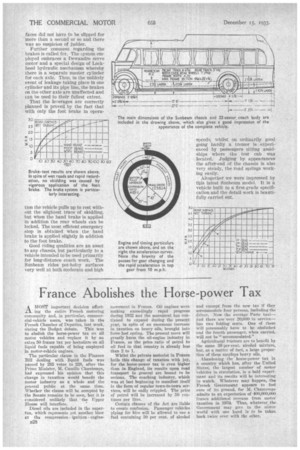France Abolishes the Horse-power Tax
Page 46

If you've noticed an error in this article please click here to report it so we can fix it.
AMOST important decision affecting the entire French motoring community and, in particular, commercial-vehicle users, was taken in the French Chamber of Deputies, last week, during the Budget debate. This was to abolish the horse-power tax on all motor vehicles and -replace it by an extra 50 francs tax per hectolitre on all liquid fuels capable of being employed .in motor-vehicle engines. The particular clause in the Finance Bill dealing with liquid fuels was passed by 285 votes to 228, after the Prime Minister, M. Camille Chantemps, bad expressed his opinion that this change in taxation, would benefit the motor industry as a whole and the general public at the same time. Whether the clause will be accepted by the Senate remains to be seen, but it ig considered unlikely that the TTPner Pollee will interfere.
Diesel oils are included in the supertax, which represents yet another blow at the compression ignition engine e28
movement in France. Oil engines were making exceedingly rapid progress during 1932 and the movement has continued to expand during the present year, in spite of an enormous increase in taxation on heavy oils, brought into force last spring. The present move will greatly harm the oil-engine industry in France. as the price ratio of petrol to oil fuel in that country is already less than 2 to 1.
Whilst the private motorist in France hails this change of taxation with joy, for the horse-power tax is even higher than in England, its results upon road transport in general are bound to be serious. The coaching industry, which was at last beginning to manifest itself in the form of regular town-to-town services, will be sadly crippled. The price of petrol will be increased by 50 centimes per litre.
Certain clauses of the Act are liable to create confusion. Passenger vehicles plying for hire will be allowed to use a fuel containing 30 per cent. of alcohol
and exempt from the new tax if they accommodate four persons, including the driver. Now thrr average Paris taxi— mid there are over 20,000 in service— has two folding seats. One of these will presumably have to be abolished and the fourth passenger, when carried, will not be "accommodated."
Agricultural tractors are to benefit by the same 30-per-cent. alcohol .mixture, hut, as a matter of fact, a large proportion of them employs heavy oils. Abandoning the horse-power tax in a country which has, after the United States, the largest number of motor Vehicles in circulation, is a bold experiment and its results will be interesting to watch. 'Whatever may happen, the French Government appears to feel sure of its ground, for M. Chauternps admits to an expectation of 400,000,000 francs additional revenue from motor taxation in 1034. Thus, whatever, the Government may give to the motor world with one hand is to he taken back twice over with the other.




































































































